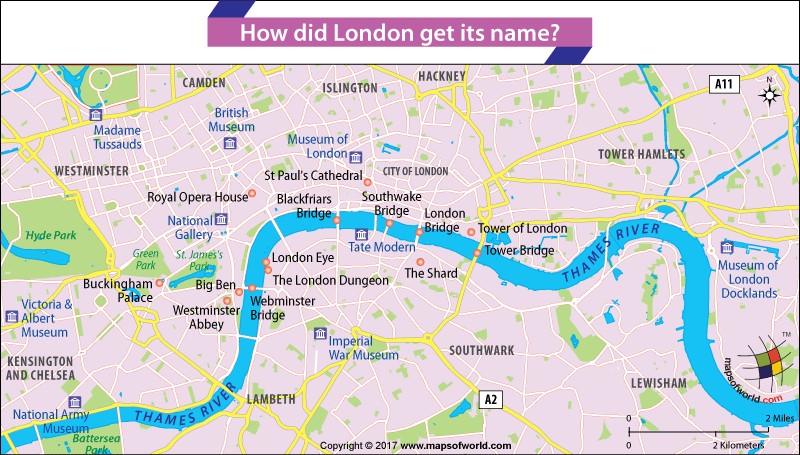How did London get its name?
London Name Origin
London, the capital city of England and the United Kingdom, is one of the most visited cities in the world. A city steeped in culture, London boasts of a history dating back many centuries. The origin of the name London is the subject matter of much debate but most historians agree that the name is a derivative of the word Londinium – the name of the port city established around 43 AD by the Romans. It is this ancient settlement that is believed to have grown into present-day London.
London’s Original Name
The debate starts with the fact that Londinium itself was referred to by other names such as Londiniensi, Londiniensium, and Londinio. This in itself should not be much of a worry given the similarity in the names. The real differences start when we wonder why the Romans decided to call their settlement on the Thames Londinium.
The Celts who lived in the region before the Roman invasion probably referred to it as Llan Dian. This literally means Temple of Diana and could have been a reference to the system of Dianic worship practiced here. The name could also have been derived from the Welsh words Llyn Dain meaning a Fort by a Pool (of the River Thames) or even from Glynn Din meaning Valley City.
Going further back in history, experts suggest that the Celts may have themselves been influenced by pre-Celtic tribes that inhabited the region, in the matter of London’s nomenclature. It looks possible that the region was called Plowonida. This comes from the words plew and need from the Pre-Celtic languages spoken in these parts. Plowonida suggests a wide basin of a flowing river and could have been a reference to the Thames. The Celtic language does not assimilate the “P” sound of most pre-Celtic words and this could have been the source of the Celtic name for London.
Another account of the name London was put forth by the controversial 12th-century writer Geoffrey of Monmouth. In his ‘The History of the Kings of Britain’ (Historia Regum Britanniae) Geoffrey says that King Lud (the brother of Cassivellaunus, contemporary of Julius Caesar) seized control of the ancient city of Trinovatum and renamed it Kaerlud, or Lud’s City. Thereafter, Kaerlud became Kaerlundein, and eventually London. Geoffrey’s works, however, are so full of fantasy, that it is quite impossible to glean historic facts from them.
There are numerous other theories, each more fanciful than the other about the origins of London’s name. These make a good read but in the absence of written records, each is difficult to prove.
Related Maps:



